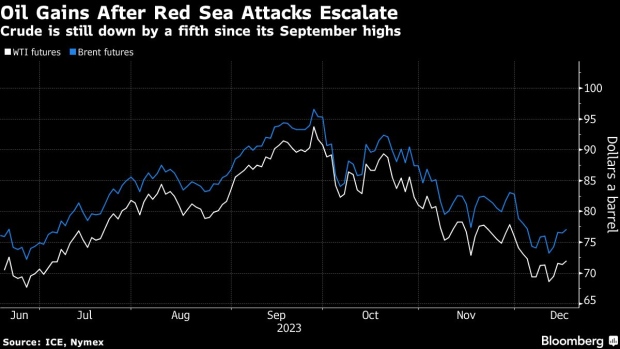Oil extends weekly gain with focus on Red Sea shipping attacks
“It’s uncertain if increased tensions in the Red Sea will have a material influence on oil prices, although the cost of logistics and shipping will rise.”

Oil rose following its first weekly gain since late October as major shipping lines suspended transit through the Red Sea, highlighting the risk to the vital artery for international crude trade.
Global benchmark Brent traded near $77 a barrel after gaining 0.9% last week to snap a seven-week streak of declines. West Texas Intermediate was near $72. Egypt’s Suez Canal Authority said it’s “closely following” tensions in the Red Sea after the US said it shot down 14 drones launched from Iran-backed Houthi-controlled areas of Yemen.
- Advertisement -
Major shippers MSC Mediterranean Shipping Co. and CMA CGM SA were the latest to announce over the weekend that they won’t send their vessels through the chokepoint in the face of rising threats, while Maersk Tankers A/S said it would insist its vessels have the option to avoid the route. Houthi militants have been attacking more and more merchant ships in the Red Sea — especially vessels that they claim are connected to Israel — in response to the war in Gaza.
- Advertisement -
Crude has lost about a fifth from a high in late September and is down 10% for the year as US shale supply beat analyst expectations and amid skepticism whether all OPEC+ members will stick to pledges to reduce output. While hedge funds are now the least bullish they’ve been in data going back to 2011, Wall Street analysts see some scope for prices to rebound next year.
- Advertisement -
Goldman Sachs Group Inc., previously among the biggest bulls, cut its forecast range for Brent in 2024 by $10 to $70-$90 a barrel in a report dated Dec. 17. That came as it boosted its outlook for US oil supply growth next year to 0.9 million barrels a day, from 0.5 million.
“The key focus remains on supply, with US crude production hitting fresh records into the end of the year,” said Robert Rennie, head of commodity and carbon research at Westpac Banking Corp. “It’s uncertain if increased tensions in the Red Sea will have a material influence on oil prices, although the cost of logistics and shipping will rise.”
Timespreads are still flashing signs of weakness, with Brent and WTI both in bearish contango — when later contracts trade at premiums to prompt ones — until the middle of next year. Brent’s six-month spread was most recently at 26 cents a barrel in contango, compared with $1 a barrel in the opposite, bullish backward-dated structure a month ago.
- Advertisement -



